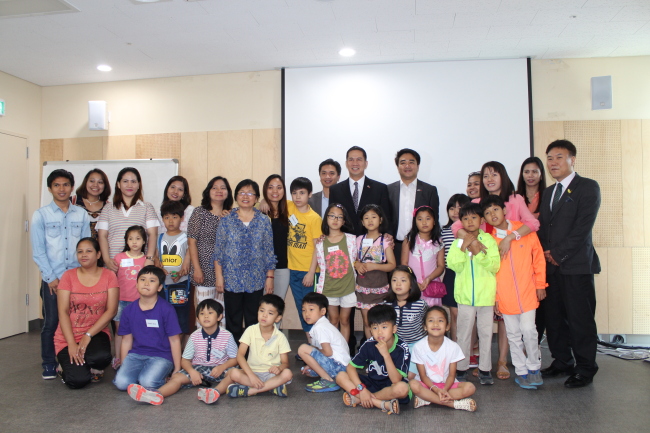Language class helps Filipino-Korean kids stay in touch with their roots
By Korea HeraldPublished : June 17, 2014 - 21:10
A Filipino language class program for Filipino-Korean children was launched in Seoul on Saturday by the Philippine Embassy.
The Wika Nga! Filipino Language Classes for Filipino-Korean Children, run in partnership with the Seoul Global Center, Pinoy Iskolars sa Korea (PIKO) Inc. and Seoul Filipino Parents and Children Organization, will run for 10 weeks at the Seoul Global Center.
“We hope we could continue this project not only until August, but make it the cornerstone of a more comprehensive and proactive engagement the embassy, in collaboration with local authorities, like the SGC, and Filipino community organizations, like PIKO and SFPCO would like to have with multicultural families through education,” Philippines Ambassador Raul Hernandez said at the opening ceremony.
The Wika Nga! Filipino Language Classes for Filipino-Korean Children, run in partnership with the Seoul Global Center, Pinoy Iskolars sa Korea (PIKO) Inc. and Seoul Filipino Parents and Children Organization, will run for 10 weeks at the Seoul Global Center.
“We hope we could continue this project not only until August, but make it the cornerstone of a more comprehensive and proactive engagement the embassy, in collaboration with local authorities, like the SGC, and Filipino community organizations, like PIKO and SFPCO would like to have with multicultural families through education,” Philippines Ambassador Raul Hernandez said at the opening ceremony.

PIKO president Ronel Laranjo, who is also the main instructor for the program, said that the project started during a children’s cultural program.
“One of PIKO’s advocacy projects is promoting Filipino culture to Korean-Filipino children here in Korea, as we were working with the children ... the mothers also brought up the issue of teaching the language,” he said.
“They are not able to teach the Filipino language inside their homes because they need to improve their Korean language as part of their acculturation.”
“The aim of this program is to strengthen the Filipino heritage of Korean-Filipino children by teaching the basic Filipino grammar,” said Laranjo
He added that the Filipino mothers would also have an active role in teaching the language outside the classroom through supplementary materials and homework.
“They also want to teach the children (Filipino) so that if they ever go to their home country they can communicate with the people there,” said Elena Delacruz, an official with the Seoul Global Center who helped organize the program.
According to Aian Caringal, the Philippine Embassy’s multicultural officer, Korea’s multiculturalism program often puts the burden of acculturation on the foreign parent, who is expected to adjust to Korean culture, traditions and language with little expectation of reciprocity.
“While official policies are beginning to consider the marriage migrants’ perspective, with the Minister of Gender Equality and Family establishing migrant women’s centers together with Korean local administrations throughout the country, public attitudes take longer to evolve,” the embassy said in a press release. “Fortunately, Confucian attitudes toward education allow such a skills-acquisition program to be viewed positively, something the Embassy is keen to emphasize to both parents.”
The two-hour classes will run each week, attended by 21 Korean-Filipino children aged 7-11 years old.
A Filipino camp will be held at the end of the program, in which students will use what they have learned from the class, PIKO said. Students will also be encouraged to join the Second Filipino Speech Contest in Korea, to be hosted by the Philippine Embassy in August.
Kim Dong-hoon, director of the SGC’s Daily Living Consultation Team, expressed appreciation for the Philippine Embassy and Filipino organizations’ efforts, “This would help Koreans appreciate multicultural families more.”
By Paul Kerry (paulkerry@heraldcorp.com)
-
Articles by Korea Herald



![[Herald Interview] 'Amid aging population, Korea to invite more young professionals from overseas'](http://res.heraldm.com/phpwas/restmb_idxmake.php?idx=644&simg=/content/image/2024/04/24/20240424050844_0.jpg&u=20240424200058)













![[KH Explains] Korean shipbuilding stocks rally: Real growth or bubble?](http://res.heraldm.com/phpwas/restmb_idxmake.php?idx=652&simg=/content/image/2024/04/25/20240425050656_0.jpg&u=)

